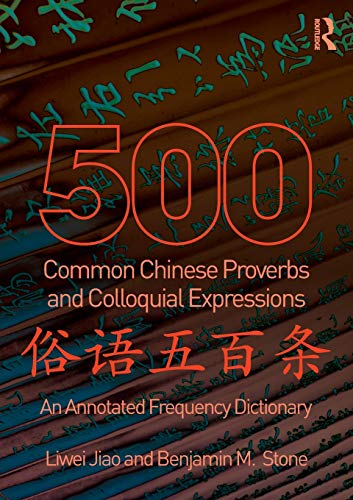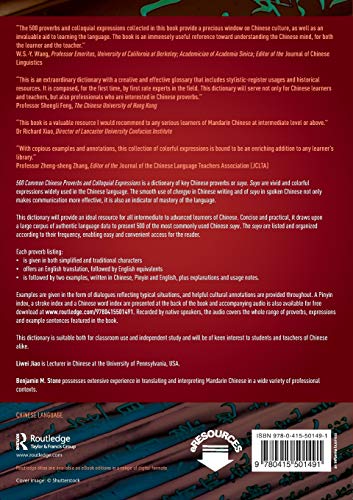Customer Services
Copyright © 2025 Desertcart Holdings Limited




500 Common Chinese Proverbs and Colloquial Expressions
W**R
Lots of fun and very useful
Lots of fun and very useful. For intermediate students of Chinese it is a nice break from boring word lists etc., and really gives the flavour of the Chinese popular mentality. You will hear lots of these phrases thrown around in normal conversation.
S**N
An Invaluable Cultural Primer
This book is an invaluable resource for the student of Mandarin who strives for native-like fluency. But for linguists, historians, Sinophiles and just the mere curious, it is also a fascinating window into Chinese culture and thought, even if you're not a Mandarin speaker. But be forewarned. I can't read just one entry or two in a sitting. It's like popcorn. Once I get started, I can't stop. A friend of mine thumbed through the one on my coffee table and made a game out of trying to figure out the proverb meanings from the literal word-by-word translations. It was so much fun she ended up buying one for her own kids.
A**R
Five Stars
Excellent. Thank you. jlw
J**E
Great new dictionary with only a few minor caveats.
This is undoubtedly a very useful collection of suyu.I'm not sure whether the lines and lines of pinyin for the example sentences are really necessary. However, short of dropping them altogether, a suitable alternative may be hard to settle on. Grace Qiao Zhang's Using Chinese Synonyms arbitrarily uses pinyin for only the words she has deemed difficult. My preference would be to only include pinyin for any duoyinzi and anything affected by tone sandhi.Another thing that could be improved in this book is the removal of the constant use of the same words in every single entry: "Translated character by character,...means... whereas the implied meaning of this proverb would be... Its function translation is..." When I say "every entry", I mean just about the whole 500 suyu have the words I have just quoted. Surely something more symbolic and user-friendly could have been substituted for this, with the extra space given over to more important material in its place, such as which part of China the suyu would most likely be heard, how the literal meaning interfaces with the metaphorical meaning, or (and here not all will agree) the Latin equivalent, if it is something rendered in Latin occasionally in English literature. John Rohsenow's ABC Dictionary of Chinese Proverbs manages very well to economise on space and cram useful information into a very small space.Finally, I found it somewhat surprising that there is no explanation of the "usage" part of the entries. "Used singly" is easy enough, but "predicate", "object", "predicative" and "attributive" need some explanation. Sure, it may seem easy to understand these terms at face value, but, to take an example, for a long time I thought I knew what "attributive" meant, until I found a book from another school of grammar that blew my categories out of the water.Given these caveats, this book is a very worthwhile investment. For what it's worth, I'm currently putting them into Anki for memorising, at the slow rate of one new one per day.I'm also very happy because the preface material doesn't refer to learners of Chinese as "foreigners", but by the less patronising, more informative and, let's face it, more educated term "non-native learners of Chinese".
A**O
Libro sobre proverbios chinos muy útil
Este libro sobre 500 proverbios chinos más comunes completa el otro dedicado a los 成语, frases de 4 caracteres típicas del chino. Ambos libros son sumamente útiles para quienes se dediquen al estudio de esta lengua milenaria
Trustpilot
2 months ago
4 days ago
2 days ago
2 months ago